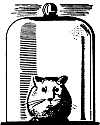 To make this unusual compound, they found in this country there
were only five 1-ounce bottles of the starting material they wanted to
use. One was selected at random and a few grams of the F-12 were
prepared. A guinea pig was placed under a bell jar with it and, much to
the surprise of a physician present, did not gasp and die - in fact, it
was not even irritated. Obviously the material was non-toxic.
To make this unusual compound, they found in this country there
were only five 1-ounce bottles of the starting material they wanted to
use. One was selected at random and a few grams of the F-12 were
prepared. A guinea pig was placed under a bell jar with it and, much to
the surprise of a physician present, did not gasp and die - in fact, it
was not even irritated. Obviously the material was non-toxic.When the other four bottles were tried, the experiment did not work. I t was later found they were not pure. The amazing thing about this whole experiment was that only one of the five bottles of this chemical contained really good material and, by sheer accident, it was picked for the first trial. If anyone of the other four bottles had' been tried, the guinea pig would have died and probably with it the research on F-12. There is no doubt about it - luck played a great part in saving time in that experiment.  As a result of the discovery of this new refrigerant, all risk of
toxic harm was removed from home or hospital refrigeration and air
conditioning. No longer need people worry about the refrigerator
leaking, and the gas injuring those who might be sleeping. When World
War II came along, as I said in the beginning, many demands were made
on our everyday products, and this tailor-made refrigerant was asked to
do an entirely new job that was not even remotely considered in the
original specifications.
As a result of the discovery of this new refrigerant, all risk of
toxic harm was removed from home or hospital refrigeration and air
conditioning. No longer need people worry about the refrigerator
leaking, and the gas injuring those who might be sleeping. When World
War II came along, as I said in the beginning, many demands were made
on our everyday products, and this tailor-made refrigerant was asked to
do an entirely new job that was not even remotely considered in the
original specifications. |








